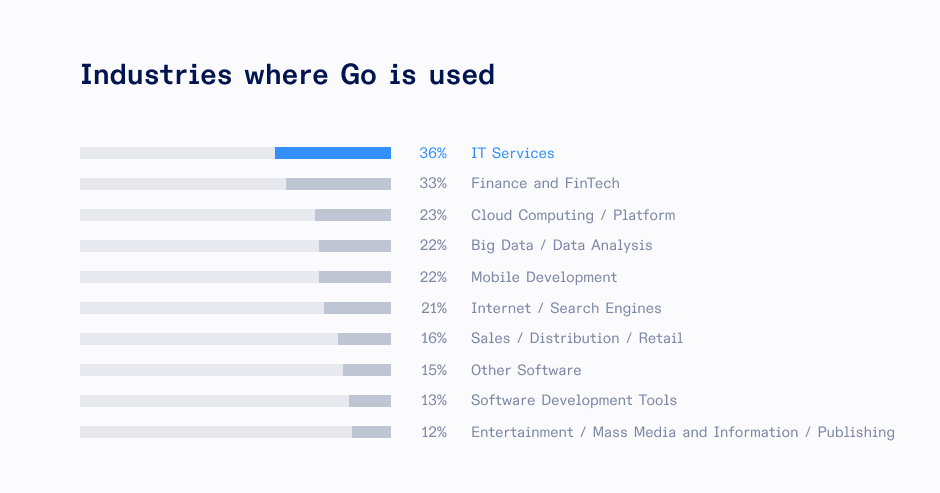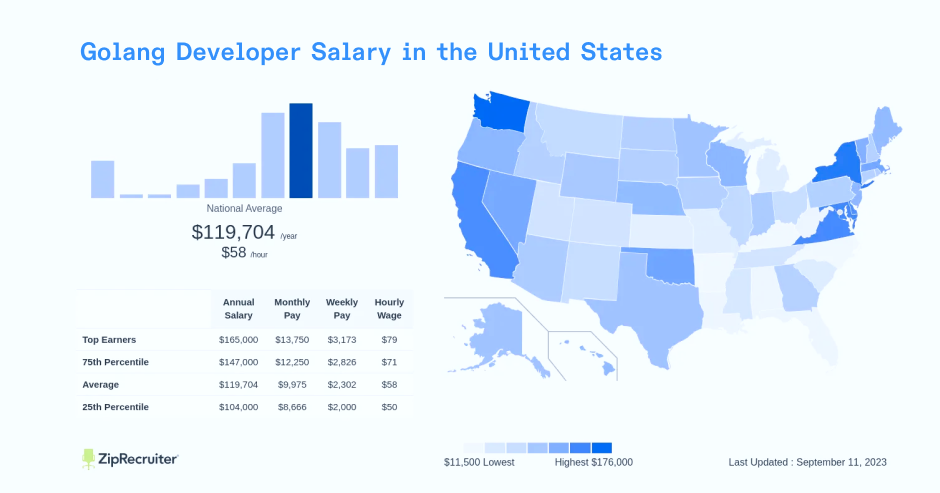Around 1.1 million skilled developers have embraced Golang as their primary programming language. If we count professionals who predominantly employ other programming languages but occasionally delve into Go, the figure expands to approximately 2.7 million.

Golang, commonly known as Go, consistently secures a spot within the top 10 list of programming languages that developers hold dear. According to the TIOBE index, a reputable programming language ranking system, Golang stands tall as one of the world's most sought-after languages. Its popularity persists due to its relevance in crafting expansive enterprise platforms, fostering the growth of AI-driven web applications, and nurturing cloud-based services.
Also read: Scala developer hiring guide
However, it's worth noting that the pool of Golang software developers remains relatively smaller compared to other programming languages. Given this context, you might be pondering how to hire talented Golang developers for your enterprise.
In this comprehensive guide, we will lead you through the essential insights required to recruit exceptional Go developers. From pivotal Go developer skills and corresponding salary expectations to the prime talent maps for sourcing qualified Go developers and effectively assessing candidates' proficiencies, we've got you covered.
Partner with Index.dev and onboard high-performing Golang developers today →
Why hire Go developers for your project?
Go possesses the capability to seamlessly step in as a replacement for Python, PHP, and Java across a wide array of tasks. Let's delve into a handful of advantages that come with the decision to bring adept Golang developers on board for your business:
- Versatility at Its Core: Go's cross-platform and hardware-compatibility feature positions it as a perfect instrument for developing a diverse range of contemporary software solutions.
- Learning Made Easy: Boasting a mere 25 keywords, Go steers clear of overwhelming newcomers with intricate syntax or convoluted variables. Its comprehensive specifications and procedural approach empower developers to make substantial contributions to projects within a matter of weeks after embracing the language.
- Harnessing Concurrency and Scalability: Through the utilization of goroutines – autonomous and concurrent functions – Golang adeptly manages multiple processes concurrently, all while optimizing memory consumption.
- Turbocharged Speed: Golang's direct compilation to machine code, bypassing byte-code, translates to swifter execution and consequently, accelerated development.
- Legibility and Sustainability: Thanks to its well-structured syntax, Go code stands out for its clarity and ease of comprehension. This clarity extends to facilitating software maintenance and updates, even if your development team undergoes changes.
- A Bounty of Tools: Beyond its expansive standard library, Go enjoys a rich ecosystem of editors, integrated development environments (IDEs), and plugins available on GitHub. Several cloud-based IDEs also lend their support to Golang, amplifying its development potential.

Partner with Index.dev and onboard high-performing Golang developers today →
Essential skills to look for in a Go developer
Incorporating this blend of technical and soft skills into your evaluation process will assist you in identifying exceptional Go developers who are well-equipped to contribute to your business's success.
Technical Acumen
- Extensive Software Development Expertise: Seek candidates with over five years of hands-on experience in software development, encompassing languages like Go, Java, and Python.
- Proficiency in Distributed Systems: Prior experience in crafting and architecting distributed systems, APIs, workflows, concurrency, multithreading, and synchronization is highly desirable.
- Mastery of Goroutine and Channel Patterns: Look for individuals well-versed in the application of common Goroutine and channel patterns.
- Command over Go Templating and Frameworks: Candidates who possess familiarity with Go templating, common frameworks, and associated tools showcase an advanced skillset.
- Container Management Proficiency: Candidates should have a background working with container management technologies such as Docker and Kubernetes.
- Adeptness in Relational Databases: Experience with SQL-based relational databases is a crucial asset.
- Microservices Prowess: Search for those who've actively designed, developed, implemented, and managed microservices within a scaled cloud environment.
Additionally, essential soft skills play a pivotal role in identifying a qualified Go developer:
Soft Skills
- Effective Communication Skills: Strong written, verbal, and interpersonal communication skills ensure seamless collaboration within teams and beyond.
- Keen Analytical Abilities: A sharp eye for identifying avenues of enhancement and optimization significantly bolsters a Go developer's capabilities.
- Effective Time Management: The ability to manage tasks efficiently, coupled with a strong organizational aptitude, empowers developers to steer project backlogs and maintain impeccable version control.
- Astute Problem-Solving: Profound problem-solving skills, coupled with an agile mindset, enable developers to skillfully engineer effective solutions that align with project requisites.
Also read: Flutter developer hiring guide
Optimal strategies for sourcing Go developers
Based on your preference for in-house or freelance Go developers, there are a range of platforms that can provide access to exceptional candidates. Let's explore some of the most renowned avenues:
- Job Boards: When seeking in-house talents, tap into prominent job boards such as Indeed, Glassdoor, SimplyHired, and ZipRecruiter. Clearly articulate your project prerequisites to effectively screen and evaluate potential Go developers.
- LinkedIn Jobs: Access a global pool of Golang developers by utilizing the platform's refined search filters to narrow down the results and pinpoint top candidates. Additionally, consider listing your Golang developer job opening on LinkedIn for streamlined applicant interaction.
- GitHub: With over 100 million developers actively engaged, you're bound to discover talent aligned with your desired candidate profile. Upon joining GitHub, access their comprehensive search engine and advanced search features, enriched with diverse filters. Scout developers based on location and their proficiency in various programming languages.
- Stack Overflow: Utilize their job board to post job advertisements and employ their advanced candidate search functionality for pinpointing the most suitable Go developer prospects.
- Freelancing Platforms: Explore platforms like Upwork, Freelancer, and Fiverr. These freelance marketplaces enable employers to post projects, which freelancers then bid on. Craft a title, job description, and budget to initiate the process. Freelance developers submit competitive bids, facilitating a comprehensive comparison for your consideration.
- Tech Recruitment Platforms: Consider utilizing specialized tech recruitment platforms like Index.dev. This platform features a network of accomplished software developers from Eastern Europe and LatAm. All applicants undergo rigorous testing and screening prior to becoming potential candidates. To identify an adept Golang developer through Index.dev, provide a detailed job description, and allow the platform's matching system to identify an ideal fit for your position. Discover how Index.dev can streamline the process of hiring skilled developers across over 100 tech domains.
Sign up to Index.dev platform now and start hiring high-performing Golang developers today→
Best tactics for a winning recruitment strategy
The process of hiring, spanning from initial job postings to extending offers, is multifaceted. When in pursuit of a skilled Go developer, optimizing your investment of time and resources is paramount. Here's a roadmap to ensure a streamlined journey:
1. Comprehend Project Scope and Complexity
Understanding your project's scale is fundamental. Research underscores that 70% of software projects meet deadlines and budget constraints when the scope is well-defined at the outset.
2. Pinpoint Requirements and Tailor Job Description
Define project prerequisites with precision. Construct a succinct job description delineating specific tasks, required proficiencies, project duration, and scope. Delve into the specifics and ascertain the desired competency level.
3. Amplify Your Vacancy's Visibility
Disseminate your job posting across diverse channels like Indeed, Glassdoor, LinkedIn, or specialized Go community platforms. Exhibit authenticity and realism in your descriptions to magnetize fitting candidates. Broaden your outreach with multiple announcements, elevating your prospects of finding an apt match.
4. Conduct Insightful One-on-One Interviews
Engage in one-on-one interviews with shortlisted Go candidates to assess their technical and soft skills. Leverage these steps:
- Present technical and thought-provoking queries: Challenge candidates with inquiries that probe their expertise and analytical capabilities. This unveils their depth of understanding in Go development.
- Practical skills examination: Assign practical coding tasks or projects to gauge coding style, architectural prowess, and real-world acumen.
- Probe soft skills: Pose hypothetical scenarios relevant to your project, assessing their strategies for resolution. Scrutinize communication, collaboration, and adaptability qualities vis-à-vis team and project requisites.
5. Facilitate Informed Decision-Making
Scrutinize incoming resumes meticulously, shortlisting based on education, certifications, experience, and proficiencies. Conduct one-on-one interviews, posing technical queries and assigning coding tasks. Evaluate candidates' fit through real-world problem-solving. Leverage platforms like HackerRank or Codility for specialized Go coding assessments.
6. Deliberate on Pros and Cons
Devote due diligence to the selection process, weighing candidates against established criteria. Seek input from fellow recruiters if required. Align your budget with the average Go developer salary rates, ensuring fiscal alignment.
Also read: Flutter developer hiring guide
Navigating Go developer salaries
Determining appropriate compensation for Go developers involves a blend of considerations including skill proficiency, demand dynamics, specialized expertise, years of experience, and geographical location. Striking the right balance between candidate fit and reasonable remuneration is pivotal. While opting for the most economical option might be tempting, this can inadvertently compromise the project's quality, resulting in elevated expenses down the line.

In the United States, the annual mean salary for Go developers hovers around $119,704, as reported by ZipRecruiter. It's worth highlighting that salary figures can fluctuate based on data sources and industry benchmarks.
On a global scale, hourly rates for Go developers typically range from $40 to $80. However, it's vital to factor in nuances such as project nature, employment arrangement (full-time, part-time, contract, or freelance), and the geographic location of the developer, which can influence these rates.
In your deliberations, prioritize the value and expertise that a Go developer contributes to your endeavor, transcending the fixation on cost alone. Investing in a skilled and proficient developer can yield enduring advantages, solidifying the triumph of your project.
Elevate your hiring efficiency with cutting-edge technology
In the pursuit of expediting and refining your hiring process, harnessing advanced technology can yield remarkable advantages. Enter Index.dev – Europe's premier talent network – offering a comprehensive solution to swiftly and effectively discover skilled Go developers. Our platform seamlessly streamlines the entire journey, from initial search to meticulous screening and seamless interviews, all to effortlessly connect you with the ideal candidates.
Also read: Our approach to sourcing engineers from Central Eastern Europe
Imagine this scenario: your budget rests at $60/hr, yet developers in the U.S. command hourly rates ranging from $80 to $200, while their counterparts in the UK demand $70 to $150. Embrace the power of Index.dev to explore developers who aren't solely located in the U.S. or UK, fitting seamlessly within your financial framework. With the world virtually at your fingertips, you can engage proficient developers across a spectrum of rates, tailored to your requirements.
Experience the capacity to:
- Access a vast network encompassing 10,000 developers.
- Identify elite Golang candidates, all within a span of 48 hours.
- Accelerate hiring by a factor of 5 through pre-vetted candidates, boasting qualifications, experience, and readiness for interviews.
If you're a seasoned Go developer on the lookout for remote software opportunities, Index.dev could be your swift path to success. Our engineers enjoy competitive salaries that frequently outpace the market average across many countries. Register now to unveil the possibilities!